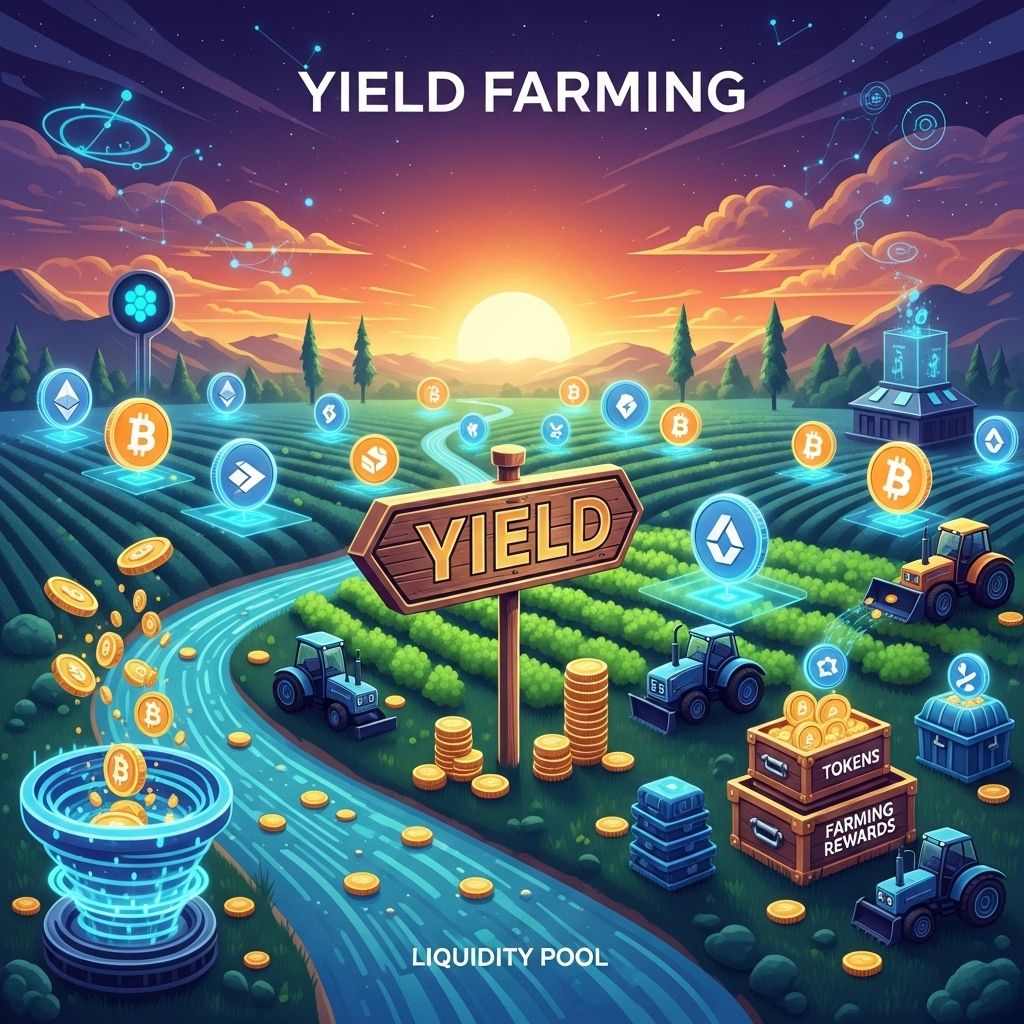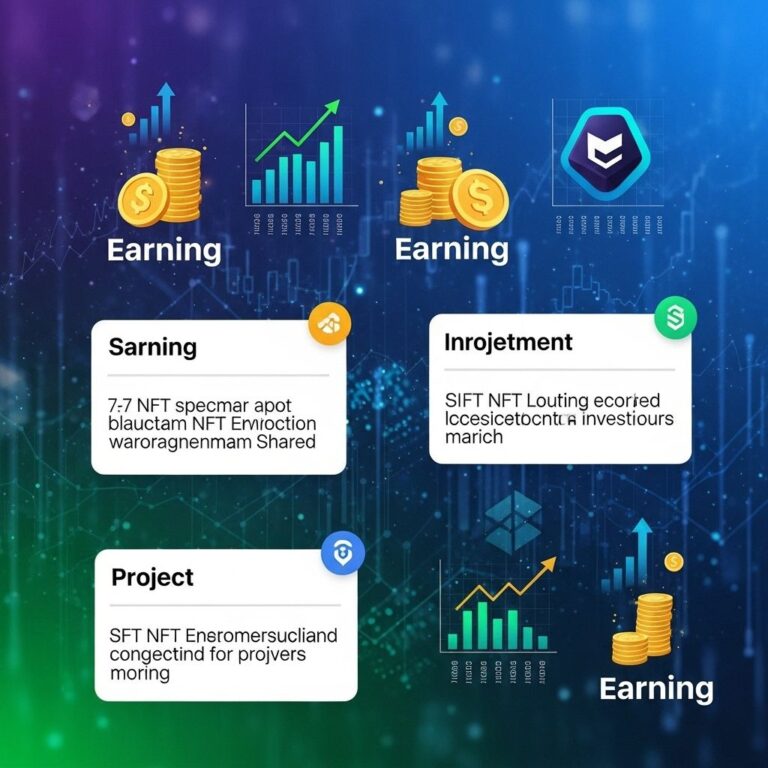In the rapidly evolving world of decentralized finance (DeFi), yield farming has emerged as a compelling strategy for investors looking to generate passive income. This innovative approach leverages the power of blockchain technology to allow users to earn rewards by providing liquidity to various protocols. In this article, we will explore the fundamental concepts of yield farming, its mechanisms, and the strategies you can employ to maximize your earnings while mitigating risks.
Table of Contents
Understanding Yield Farming
Yield farming, at its core, refers to the process of earning rewards by locking up cryptocurrencies in decentralized finance applications. These rewards can come in the form of interest, governance tokens, or other cryptocurrencies, and are typically generated through lending, liquidity provision, or staking activities.
Key Components of Yield Farming
- Liquidity Pools: These are pools of tokens locked in smart contracts that allow users to trade assets without the need for centralized exchanges.
- Smart Contracts: Self-executing contracts with the terms of the agreement directly written into code, enabling automated transactions and reducing the need for intermediaries.
- Tokens: Various tokens are used within DeFi platforms, including stablecoins, governance tokens, and native tokens of the platform.
How Yield Farming Works
The yield farming process generally involves the following steps:
- Select a DeFi Protocol: Choose a platform that offers yield farming options, such as Uniswap, Aave, or Yearn.finance.
- Provide Liquidity: Deposit your assets into a liquidity pool. In return, you’ll receive liquidity tokens representing your share of the pool.
- Earn Rewards: As traders use the liquidity pool, you’ll earn fees or other rewards, which can be further reinvested to amplify your returns.
Popular Yield Farming Protocols
| Protocol | Type | Key Features |
|---|---|---|
| Uniswap | DEX | Automated market maker, no order book, liquidity mining rewards. |
| Aave | Lending | Interest rate switching, collateral swapping, and flash loans. |
| Compound | Lending | Interest earning on assets, COMP governance tokens for usage. |
| Yearn.finance | Aggregation | Automated yield optimization, vaults for liquidity pooling. |
Strategies for Effective Yield Farming
To make the most of your yield farming experience, consider implementing the following strategies:
Diversify Your Investments
Just like any other investment strategy, diversification is key in yield farming. By spreading your assets across multiple protocols and pools, you can mitigate risks associated with impermanent loss and smart contract failures.
Understand Risks Involved
- Impermanent Loss: This occurs when the price of your deposited assets changes compared to their price at the time of deposit, leading to potential losses.
- Smart Contract Risk: Bugs or vulnerabilities in smart contracts can lead to loss of funds. Always assess the protocol’s code and audit history.
- Market Volatility: The cryptocurrency market is highly volatile. Prices can fluctuate dramatically, impacting your overall returns.
Reinvest Earnings
Maximizing your yield farming returns often involves reinvesting your earnings back into the liquidity pools. This strategy, known as compounding, allows your rewards to generate additional income over time.
Analyzing Yield Farming Opportunities
With numerous yield farming opportunities available, it’s essential to analyze potential investments carefully. Consider the following factors:
- Annual Percentage Yield (APY): This metric indicates the potential earnings on your investment. Compare APYs across different platforms.
- Liquidity and Volume: Assess the liquidity of the pool you are considering. Higher liquidity often means lower slippage and more stable returns.
- Community and Developer Support: Strong community engagement and active developers can enhance the reliability and longevity of a protocol.
Tools for Yield Farmers
Several tools and platforms can assist you in your yield farming journey:
- DeFi Analytics Platforms: Websites like DeFi Pulse and DappRadar provide insights and analytics on various DeFi protocols.
- Portfolio Trackers: Tools such as Zapper and Zerion help you track your investments across different DeFi protocols.
- Yield Calculators: Use tools that allow you to calculate potential yields based on various factors and scenarios.
The Future of Yield Farming
As technology continues to evolve, so too will the strategies and platforms associated with yield farming. Innovations in layer-2 solutions and cross-chain compatibility are expected to enhance user experience, reduce fees, and provide even more lucrative opportunities for passive income generation.
In conclusion, yield farming presents an exciting opportunity for tech-savvy investors to unlock passive income strategies in the decentralized finance landscape. By understanding the mechanisms involved, implementing effective strategies, and remaining vigilant to risks, you can successfully navigate the ever-changing world of yield farming and capitalize on its potential.
FAQ
What is yield farming?
Yield farming is a practice in decentralized finance (DeFi) where users lend or stake their cryptocurrencies in exchange for rewards, typically in the form of additional tokens.
How does yield farming generate passive income?
Yield farming generates passive income by allowing users to earn interest or rewards on their crypto holdings through liquidity provision or by staking assets in various DeFi protocols.
What are the risks associated with yield farming?
The risks of yield farming include smart contract vulnerabilities, impermanent loss, market volatility, and regulatory uncertainties that may affect the value of staked assets.
Can beginners participate in yield farming?
Yes, beginners can participate in yield farming, but it’s important to do thorough research and understand the risks and mechanics before getting involved.
What platforms are popular for yield farming?
Popular platforms for yield farming include Uniswap, Aave, Compound, and PancakeSwap, each offering different strategies and rewards.
How can I maximize my returns from yield farming?
To maximize returns from yield farming, users should consider factors such as choosing high-yield pools, understanding liquidity provider fees, and regularly monitoring market trends.






